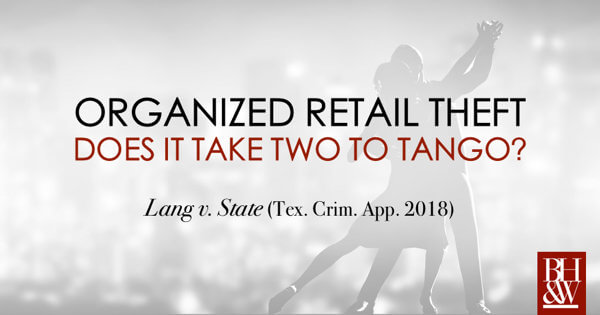Theft By Deception? County Official Uses Airline Flight Voucher (Purchased with Government Charge Card) to Buy a Plane Ticket for his Son.
 In Fernandez v. State, the Texas Court of Criminal Appeals considered the case of a Val Verde County Justice of the Peace who used an airline voucher for a flight that was unrelated to a government purpose. The CCA discusses the offense of Theft by Deception in Texas, explaining what it means and what it doesn’t mean. It is an interesting case because it seems so petty – the amount was only 300 dollars and some change. Why didn’t the JP simply purchase a new ticket for his son? Read more.
In Fernandez v. State, the Texas Court of Criminal Appeals considered the case of a Val Verde County Justice of the Peace who used an airline voucher for a flight that was unrelated to a government purpose. The CCA discusses the offense of Theft by Deception in Texas, explaining what it means and what it doesn’t mean. It is an interesting case because it seems so petty – the amount was only 300 dollars and some change. Why didn’t the JP simply purchase a new ticket for his son? Read more.
Travel Plans Arranged
James Fernandez was charged with “theft by deception” in 2012. Fernandez, serving as a Justice of the Peace in Val Verde County, wanted to travel to Orlando, Florida for a work-related conference in June of that year. After obtaining permission to travel to the conference and to use his government-issued credit card for airfare, Fernandez asked his office clerk to book the flight. The clerk made flight arrangements with Southwest Airlines.
Travel Plans Cancelled
Just before the conference, Fernandez became ill and cancelled his flight itinerary. Per Southwest Airlines’ refund policy, the airline issued a “refund-voucher” to Fernandez, in his name, valid for travel until February 2013. The refund-voucher was valued at $381.60, a dollar-for-dollar match to the amount originally paid for the ticket to Orlando.
In August, Fernandez asked his office clerk for the flight information from the cancelled Orlando trip. Once the clerk located the information, Fernandez told the clerk to give the flight reservation number to his son, Fernandez Jr.. The clerk complied.
Routine Audit Leads to an Investigation
During a routine review of the County’s flight budget, the County Auditor contacted Southwest, attempting to get a full refund of the flight. At that time the Auditor learned that the refund-voucher from the Orlando ticket had been used by Fernandez for a flight to Phoenix, Arizona in August. The auditor also learned that Phoenix flight incurred additional fees, fees that were not paid for by the county. Relying on Val Verde County’s policy that prohibits the use of county property for personal use, the auditor reported the transaction, triggering an investigation by the Attorney General.
Too Late to Repay, Fernandez Goes to Court
Soon after, Fernandez tried to pay for the airline voucher, but the auditor refused to accept his payment. Fernandez was charged with “theft by a public servant by way of deception.” At trial, Fernandez Jr. testified that his father had intended to repay the county, nevertheless, Fernandez was convicted—a conviction upheld by the Fourth Court of Appeals. Fernandez appealed to the Court of Criminal Appeals (“CCA”) for relief, arguing that State failed to prove he induced consent by way of deception at the time he misappropriated the government’s refund-voucher. The CCA must determine whether Fernandez committed “theft by deception” when he purchased online airfare for government-related travel with a government credit card, but canceled, using the refund-voucher for personal travel without “correcting the impression” that the refund-voucher would be used for future government-related travel.
What is Theft by Deception Under Texas Law?
Texas law defines theft as, “the unlawful appropriation of property with the intent to deprive the owner of the property.” Tex. Penal Code § 31.03(a). “Appropriation is unlawful if it is without the owner [of the property’s] effective consent.” Id. § 31.03(b)(1). Consent is defined as, “assent in fact, whether express or apparent,” and is “not effective if it is induced by deception or coercion.” Id. § 1.07(a)(11); §31.01(3)(A). Deception means, “failing to correct a false impression…fact that is likely to affect the judgment of another in the transaction, that the actor previously created…by words or conduct, and that the actor does not now believe to be true.” Id. § 31.01(1)(B). The burden of proof is on the State to prove “that the owner of the misappropriated property was induced to consent to its transfer because of a deceptive act of the defendant.” Geick v. State, 349 S.W.3d 542, 548 (Tex. Crim. App. 2011); Daugherty v. State, 387 S.W.3d 654, 659 (Tex. Crim. App. 2013).
The CCA Decides
Here, the CCA explains that “consent” is a key issue—that the initial consent Fernandez received from his office to use the government credit card to make the flight reservation was not the consent that is the basis of the conviction. Rather, it was the consent Fernandez obtained when he asked his clerk to send the information to his son, “because without the voucher number, Fernandez would have been unable to access the [information]” to book the flight to Phoenix. Further, the county, by way of its agent [the clerk], assented to the refund-voucher’s use because the agent gave the cancelled flight information to Fernandez and his son in August.
Moreover, the CCA says that the consent was obtained through deception. Fernandez established with his office that he would be attending a work-related conference in June, thus creating the impression that county funds were being used for a work-related purpose. Once the flight was cancelled, the refund-voucher that was issued is to be considered the county’s property, “just as the ticket to Orlando had been [considered county property].” Fernandez failed to correct the impression that he was using the ticket/refund-voucher for work-related travel, instead using the refund-voucher for personal travel without telling anyone in the Val Verde County’s business office. “By remaining silent, [Fernandez] left intact the impression he created…that the [refund-voucher] would be used for county-approved travel.” The CCA affirmed the decisions rendered by the trial and appeals courts.
Judge Johnson filed a concurring opinion that simplified the majority’s opinion. “When [Fernandez] failed to…tell the county….that he had not used the original ticket…and [did not] surrender the voucher, [Fernandez] failed to correct the impression of appropriate travel on county business that he had previously created.” This alone was the deception that is required to support the conviction.
_______
Barnett Howard & Williams PLLC is a criminal defense law firm in Fort Worth, Texas. Our criminal defense attorneys handle all felony and misdemeanor offenses in Tarrant County and surrounding areas. For more information about our attorneys, visit our Firm Profile page.










